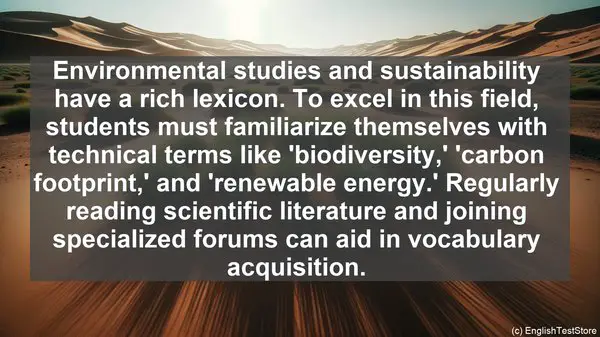1. Mastering Technical Vocabulary
Environmental studies and sustainability have a rich lexicon. To excel in this field, students must familiarize themselves with technical terms like ‘biodiversity,’ ‘carbon footprint,’ and ‘renewable energy.’ Regularly reading scientific literature and joining specialized forums can aid in vocabulary acquisition.
2. Understanding Academic Jargon
Academic writing often employs complex jargon. Students should invest time in comprehending phrases like ‘paradigm shift,’ ‘socio-ecological systems,’ and ‘environmental justice.’ Online glossaries and academic papers can serve as valuable resources.
3. Utilizing Discourse Markers
Discourse markers, such as ‘moreover,’ ‘however,’ and ‘consequently,’ enhance the flow and coherence of written and spoken English. They help structure arguments, highlight contrasts, and establish causal relationships, making the communication more persuasive.
4. Employing Passive Voice
The passive voice is frequently used in scientific writing. It allows the focus to be on the action and not the doer. For instance, ‘The experiment was conducted’ instead of ‘We conducted the experiment.’ This style is valued for its objectivity and formality.
5. Practicing Data Description
Environmental studies often involve data analysis and interpretation. Students should be adept at describing data accurately and concisely. This includes using appropriate visual aids, such as graphs and charts, and employing precise adjectives and adverbs.

6. Mastering Conditional Sentences
Conditional sentences are prevalent in scientific discussions. Students should be well-versed in constructing sentences with ‘if,’ ‘when,’ and ‘unless.’ These sentences express hypotheses, predictions, and cause-effect relationships.
7. Enhancing Cohesion with Linking Words
Linking words, like ‘however,’ ‘in addition,’ and ‘furthermore,’ connect ideas and paragraphs, creating a cohesive text. They guide the reader through the argument, ensuring a logical progression of thoughts.
8. Polishing Abstract Writing
Abstracts are concise summaries of research papers. Students should focus on including the study’s objective, methodology, key findings, and implications. Precision and brevity are crucial in this genre.
9. Participating in Group Discussions
Group discussions provide opportunities to exchange ideas and gain diverse perspectives. Students should actively contribute, using phrases like ‘I agree with you because…’ or ‘Another aspect to consider is…’ This fosters collaborative learning.

